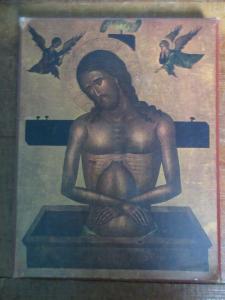As Catholics know all too well, our Church has a serious illness, one that has been insufficiently treated for too long. Whatever causes we may each prefer to blame, St. Paul gives us a prescription in today’s epistle reading, the great Christ hymn preserved in his letter to the Philippians:

Christ Jesus, though he was in the form of God, / did not regard equality with God / something to be grasped. / Rather, he emptied himself, / taking the form of a slave, / coming in human likeness; / and found human in appearance, / he humbled himself, / becoming obedient to the point of death, / even death on a cross. / Because of this, God greatly exalted him / and bestowed on him the name / which is above every name, / that at the name of Jesus / every knee should bend, / of those in heaven and on earth and under the earth, / and every tongue confess that / Jesus Christ is Lord, / to the glory of God the Father.
St. Paul precedes this hymn with an instruction: to have “the same attitude.” And this is crucial. The way to Christ’s own exaltation was through his kenosis – his self-emptying, slave-like humility, obedient to the point of death. It is because of this that his name is above every name. How much more then can we, the servants of the suffering servant, not dare grasp at Christ-like exaltation until we have passed through Christ-like humility.
As I have said before and will continue to say as long as it’s necessary, this hymn to the kenotic Christ must become the basis for a radical ecclesiology so old it looks new: not grasping at godlike power over nonbelieving fellow humans, but humbling ourselves, emptying ourselves, serving all not from a position of means and privilege that condescends to help the less fortunate, but in the form of a slave. Ecclesiologically, this may mean forfeiture of some of the means and privileges and even rights we have previously claimed. It may lead us to the point of the death of some of our institutions, even worthy ones. As tragic as that may be, it can’t be worse than the spiritual death, and public fall from grace, that will be inevitable if self-protection and PR optics continue to be prioritized over protection and care for the vulnerable – in which case there will still be considerable institutional death, and at a much greater cost.
This Pauline prescription is hard to swallow. It goes against the grain of certain longstanding, deep-seated impulses (and speaking in terms of organizationally self-protecting attitudes, lay Catholics are by no means off the hook here). All the more reason why it’s so desperately needed now, and why our very moral credibility depends on it.












